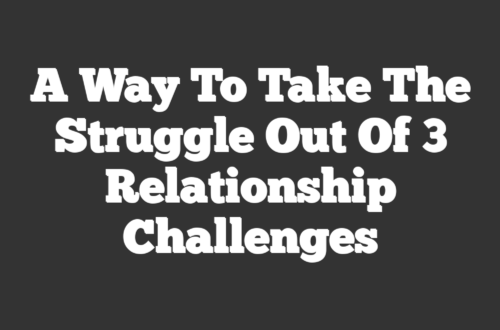
Who hasn’t been there?
The heavy silence, the uneasy atmosphere, the wide rift that suddenly opens up right in front of your face. One minute you and your partner are at peace; the next, you’re caught up in an emotional whirlwind that leaves you feeling drained, misunderstood, and disconnected.
Arguments, disagreements, and fights—they are all part and parcel of any relationship. And there’s no sugarcoating it: arguments can shake even the most rock-solid relationships.
This may sound counterintuitive but the strength of a relationship lies not in the absence of conflict but in the ability to resolve it. So, what do you say?
How do we mend the cracks, acknowledge the hurt, and still stand firm on our own perspectives? How do we extend an olive branch without feeling like we’re losing ourselves in the process?
What to Say to Your Partner After a Big Argument
Acknowledge the Argument
Ignoring an argument is like covering a crack in a wall with a layer of paint. It might hide the imperfection, but it doesn’t fix the underlying issue.
Begin by acknowledging the argument. This isn’t about who was right or who was wrong but about understanding that a rupture has occurred. It’s about letting your partner know that you recognize the elephant in the room and are ready to address it.
Never underestimate the power of a genuine “I’m sorry.”
This simple phrase, when uttered sincerely, carries immense weight. But remember, an apology without understanding why you’re apologizing can sometimes feel hollow to your partner. Aim for an apology that recognizes the pain you’ve caused.
You could say something like:
- “It’s evident we had a big argument, and I know it has affected us both.”
- “We’ve had a serious argument, and it’s clear we both feel strongly about this issue. It’s okay, these things happen in relationships.”
- “I understand that we’ve had a significant disagreement, and I want to acknowledge that.”
- “I know we just had a big argument, and we must talk about it.”
- “I realize we had a heated discussion, and I want to ensure we’re okay.”
- “I understand we’ve had a rough patch, and it’s something we should address.”
- “We had quite a big argument, didn’t we? I think we have a little unpacking to do of what happened.”
- “I know our conversation got intense, and I want to work through it with you.”
- “I realize our discussion was quite intense. I believe we need to talk about it.”
- “We had a big argument, and I want us to understand each other better. Let’s discuss it?”
Remember: The point here is not to reopen the wound but to show you're willing to take steps toward healing it.
Express Your Feelings
Once you have acknowledged the argument, it’s time to express your feelings. Not just any feelings, but your real, deep, raw feelings.
This isn’t about pointing fingers or revisiting who said what. Instead, it’s about sharing how the argument impacted you emotionally.
Speak from your heart. Share your feelings with honesty and vulnerability. By doing so, you invite your partner to understand your perspective, which helps them empathize with you.
Instead of saying, “You never listen to me,” reframe it to express how you feel. Remember that the most effective expressions of feelings come from a place of honesty and vulnerability.
Consider the following lines:
- “I’ve felt quite upset because of what happened, and it’s been hard for me to let go of that.”
- “I feel unheard and would appreciate it if you could listen to my perspective.”
- “I’m feeling confused about what happened. Can we clarify things?”
- “I felt hurt by what you said, even though I know you didn’t mean to hurt me.”
- “I feel like our argument was more about winning than understanding each other.”
- “I feel that we lost respect for each other in the heat of the argument.”
- “I’m feeling quite uncomfortable because I feel like there’s a wall between us now.”
- “I didn’t feel valued during our argument. Can we try to respect each other more?”
- “I feel disappointed that we couldn’t resolve our conflict more effectively.”
- “I was saddened by how quickly our conversation turned into an argument.”
Expressing your feelings can be scary, especially after a heated argument. But remember, vulnerability is the path to connection. And when your partner shares, truly listen. This is not about winning an argument; it’s about strengthening your bond.
The Speaker-Listener Technique
The Speaker-Listener Technique, as its name suggests, involves one person assuming the role of the speaker while the other takes on the role of the listener. Its primary goal is to foster clear and respectful communication, especially during emotionally charged conversations.
This method has a defined structure, outlined as follows:
- Partners alternate turns as the speaker and the listener. A physical object (e.g., a pen) is often used to signify the speaker.
- The speaker expresses their feelings, thoughts, or concerns while the listener remains silent, focused solely on understanding the speaker’s perspective.
- After the speaker finishes, the listener paraphrases or reflects back on the speaker’s message to confirm their understanding.
- If the speaker feels accurately heard and understood, they switch roles and repeat the process.
This technique sets specific guidelines for each role to ensure respectful and productive communication:
Speaker rules:
- Speak for yourself.
- Avoid mind-reading.
- Talk in small chunks.
Listener rules:
- Focus on understanding the speaker.
- Avoid interrupting.
- Paraphrase what you hear to ensure you understand the message.
The Speaker-Listener Technique is particularly helpful when discussions become intense or involve sensitive topics. It helps partners to steer clear of negative communication patterns such as escalating conflicts, invalidating feelings, or making negative interpretations.
Validate Your Partner’s Feelings
After a big argument with your partner, it’s natural to feel a mix of emotions: anger, frustration, sadness, or even guilt. The aftermath of a heated disagreement can leave both of you feeling emotionally drained and distant. But don’t let that distance linger!
At the core of every heated argument often lies the yearning for validation. People want to feel heard, seen, and understood. And it’s your role to facilitate this process, even if you disagree with their point of view.
Here’s how you can start:
- “I can see this has hurt you, and your feelings matter to me.”
- “I recognize how much this has affected you, and I’m sorry that you’re feeling this way.”
- “I appreciate you expressing how you feel, and I want to understand your perspective more deeply.”
- “I acknowledge that what I said/did upset you, and that’s valid.”
- “I’m sorry if my actions caused you pain. I can see why you would feel that way.”
- “I can see how what I said could have made you feel taken for granted. That wasn’t my intention.”
- “I see why that made you angry. I would feel the same in your shoes.”
- “I didn’t realize the impact of my actions on you. I understand your feelings better now.”
- “I see now that my actions might have made you feel excluded. I didn’t mean for that to happen.”
- “I realize now that I didn’t fully understand your point of view. Your feelings are valid.”
Remember: Validation doesn't equate to agreement; it means acknowledging that their feelings are important. It can work wonders. It shows that you've been listening, truly listening. It tells your partner that their feelings are valid and important to you.
When you validate your partner’s feelings, you create a safe space for empathy and understanding to flourish. You communicate, in no uncertain terms, that even amidst disagreement, you respect their emotions. This action can dispel lingering resentments and prepare the ground for resolution.
Take Responsibility and Apologize Genuinely
Now, taking responsibility can seem like an uphill task, especially when you’re convinced that you’re in the right. But let’s face it, no one is perfect, and arguments typically involve some level of responsibility from both sides.
So, admit your part, no matter how small or insignificant it may seem.
Be straightforward about it. Tell your partner, “I understand that I shouldn’t have said what I said, and I apologize.” This simple admission does more than just show your willingness to own up to your actions. It embodies your commitment to the relationship, the acknowledgment that your bond is bigger than any disagreement.
Now, taking responsibility might also sound something like:
- “I can see how my words/actions contributed to this situation, and I am willing to do better.”
- “I’m sorry for not considering your feelings. I will try to be more sensitive in the future.”
- “I regret my response to our disagreement. I will aim to handle things more constructively next time.”
- “I need to work on being more open to your viewpoint. I’m sorry for not doing that this time.”
- “I didn’t mean to upset you with my words. I will try to express my thoughts more kindly from now on.”
- “I apologize for not listening better. Your thoughts and feelings are important to me, and I will make an effort to improve.”
- “I’m sorry for the role I played in our disagreement. I will work on being more understanding and less confrontational.”
- “I recognize that my response was out of line. I will do my best to manage my emotions better in the future.”
- “I regret my actions and the hurt they caused. I commit to learning and growing from this experience.”
Propose Solutions
Now you might think that this is the part where you are both gonna sweep things under the rug and move on. But no—this is the time to dig deep and address the root of the issue. To propose solutions that will prevent history from repeating itself.
It’s time to show that you’re not just interested in ending the argument but in fostering growth, as well. Here’s how to do it:
Identify the Core Issue
Often, recurring arguments are just symptoms of a deeper problem. Maybe it’s about not spending enough time together, feeling unheard or unappreciated, or differing expectations.
Start here:
- “I feel like there might be a deeper issue behind our arguments about ____.”
- “Do you think there might be something else causing these recurring disagreements?”
- “What do you think is at the heart of our ongoing arguments about ____?”
Open a Dialogue
Start a conversation with your partner about these core issues when both of you are calm and open. Acknowledge the pattern and express your desire to work together to find a solution.
For instance, you could say:
- “I’ve noticed we often argue about ____. Can we discuss what’s really bothering us?”
- “Let’s have a calm, open discussion about our recurring issues. When would be a good time?”
- “Can we sit down and talk about why we keep having this same argument?”
Active Listening
Each person needs to genuinely listen to the other’s point of view without interjecting or planning a response. Try to understand your partner’s feelings and needs regarding the issue.
Here are some guide questions:
- “I hear you saying that ____. Have I understood you correctly?”
- “I want to understand your point of view better. Could you elaborate more on ____?”
- “Could you help me understand why this issue is important to you?”
Brainstorm Together
Collaboratively brainstorm potential solutions. Make a list of all the possible ways you could address the problem, even the ones that seem outlandish. This creative process can help you both feel more invested in the outcome.
Create a Plan
Once you’ve got a list of potential solutions, discuss them together and agree on a plan of action. Make it as specific and practical as possible.
- “How about we try ____ for a month and see how it goes?”
- “I think ____ could be a good solution. What are your thoughts?”
- “Could we agree on trying ____ as a solution to our problem?”
Check-in Regularly
Agree to check in with each other about the issue at regular intervals. Is the plan working? If not, what needs to change? This helps keep communication open and ensures the solution actively addresses the problem.
Be Patient
Change doesn’t happen overnight. Be patient with each other, and remember that it’s about progress, not perfection.
Tip: Discuss, deliberate, and decide. And remember, these solutions need to be practical and agreeable to both parties. Propose actions that are fair and considerate of both your feelings.
Reaffirm Your Commitment
A disagreement, no matter how severe, should not shake the foundations of your bond.
Once the storm has passed, it’s crucial to reconnect on an emotional level. This is the time to remind your partner about what makes your relationship special.
Here’s how you can express this:
- “We may fight, but I want you to know that I am not going anywhere.”
- “This disagreement doesn’t change how much I love and care for you.”
- “We’re in this together, and we’ll figure it out, just like we always do.”
- “Despite our argument, I want you to know that I am still committed to us and to working things out.”
- “We may have had a rough patch, but I believe in us and our ability to overcome this.”
- “We might not always see eye to eye, but I am committed to understanding your perspective and growing together.”
- “Even when we argue, I want you to know that you are my number one.”
- “Remember that no argument can change my commitment to you and our relationship.”
- “We may argue, but at the end of the day, my love and dedication to you remain unwavering.”
- “After every storm, my commitment to you only strengthens. We will get through this together.”
Reaffirm your shared dreams, hopes, and plans for the future. Let your partner know that an argument is just a small bump in the road, not a dead end. Reiterate that you’re on this journey together, and a disagreement won’t derail your shared path.
Sometimes, a simple act of reaffirmation can bridge the gap caused by a heated argument, helping you re-establish the bond with your partner.
Two Cents: Resolving Arguments in a Relationship
You might have heard it countless times: communication is key. You’re probably thinking, “Yeah, I know.”
But do you really? Because, you see, it isn’t just about communicating when things are all sunshine and rainbows. It’s also about weathering the storm together when disagreements inevitably creep in.
The act of calmly addressing an argument shows respect for each other’s feelings, builds trust, and fosters better communication. And believe it or not, it can even make your bond stronger!
However, on the flip of the coin, if arguments are not resolved effectively, they can lead to resentment and distance, ultimately weakening the relationship.
Unresolved arguments can lead to:
- Decreased communication
- Lowered relationship satisfaction
- Increased likelihood of future arguments
- Emotional distress
Unresolved arguments have a nasty habit of resurfacing, often at the most inopportune times. So, avoiding them altogether isn’t the solution.
As the saying goes, “The only way out is through.” This applies to arguments too. The only way to truly move on from an argument is to work through it, not around it.
So, how can you prevent these negative outcomes?
Here’s a simple list:
- Address arguments head-on.
- Speak your truth, but also listen empathetically to your partner’s perspective.
- Understand that it’s okay to agree to disagree.
- Apologize if you’re wrong, and forgive when you’re hurt.
Frequently Asked Questions
When should I approach my partner after an argument?
The timing of when you approach your partner after an argument is best determined on a case-by-case basis, as it depends on the individuals involved, the severity of the disagreement, and your partner’s need for space and time to process emotions.
In general, it’s important to give each other some time to cool down and reflect on the situation. A good rule of thumb is to wait a few hours or even a day before discussing the issue further.
However, avoid letting too much time pass, as that can lead to emotional distance and unresolved issues festering in the relationship.
How can I keep communication productive during a disagreement?
To maintain productive communication during a disagreement, here are some strategies you might consider:
• Active listening: Demonstrate that you’re genuinely interested in understanding your partner’s perspective. This means not only hearing their words but also trying to understand the feelings and thoughts behind those words.
• Stay on topic: Stick to the issue at hand. Bringing up past, unrelated arguments can escalate the situation and divert from the problem you’re trying to address.
• Ask clarifying questions if you’re unsure about what your partner is saying. This shows you’re trying to understand their perspective.
• Take breaks if needed: If the conversation is becoming too heated or unproductive, it’s okay to suggest taking a break and returning to the conversation later when emotions have cooled down.
What if my partner refuses to engage in a productive conversation after an argument?
If your partner is unwilling to discuss the issue, it’s important to give them space and not force the conversation. Consider these steps:
• Give them space: They might need more time to cool down or process the argument. Be patient.
• Express your needs: In a calm and gentle way, express your need for resolution and healthy communication.
• Seek professional help: If the problem persists, it may be beneficial to seek help from a relationship counselor who can mediate the discussion and provide constructive advice.
What should I avoid saying during an argument?
Avoid these communication pitfalls during an argument:
• No personal attacks: Avoid attacking your partner’s character or personality. Focus on their actions instead.
• Don’t disregard feelings: Phrases like “You’re overreacting” can dismiss your partner’s feelings and make them feel unheard.
• No absolutes: Statements like “You never listen to me” or “You always forget important dates” are not only generally inaccurate but also tend to escalate the argument.
• No name-calling or insults: Disrespectful language, belittling comments, and personal attacks can lead to emotional harm and won’t solve the problem at hand.
How do I know if our arguing has become unhealthy?
An argument can be seen as a way of clearing the air and addressing underlying issues. However, it becomes unhealthy when:
• Feeling afraid to express your opinion or concerns.
• Consistently resorting to personal attacks or insults.
• Repeatedly rehashing old arguments without resolution.
• If one or both partners consistently avoid arguments or discussions.
Takeaways
Dealing with the aftermath of a major disagreement with your partner can be challenging. Yet, the things you say and do can make all the difference between a growing divide or a bridge to stronger understanding.
Here’s a quick recap to help you through:
- Acknowledge the argument
- Express your feelings
- Validate your partner’s feelings
- Take responsibility
- Propose solutions
- Reaffirm your commitment
Remember, every argument is an opportunity to better understand your partner. These moments can be utilized to turn disputes into stepping stones, leading you toward a stronger, happier, and healthier partnership.
Keep in mind that a successful relationship isn’t one without arguments but one where disputes are handled in a healthy and constructive manner.




